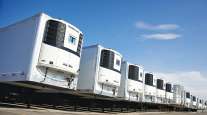Refrigerated Fleets Seek Reimbursement for Rising Costs of Cooling Shipments
This story appears in the April 25 print edition of Transport Topics.
While all fleet managers are waging a battle with soaring diesel prices, refrigerated carriers are facing a second front in terms of collecting fuel surcharges to cover the cost of buying the red-dyed diesel that powers the engines of their reefer units.
It takes burning hydrocarbons to keep meat, ice cream, produce and pharmaceuticals cold, and the price of reefer fuel is rising at the same pace as other petroleum products. While fuel surcharges have become a well-established standard for the diesel used in tractors, collecting them for reefer fuel has resulted in mixed success so far, but industry executives are mounting a campaign to make reefer fuel surcharges more commonplace.
“This is a huge issue for us. Traditionally this has been hard to collect on, but we’re pushing hard and heavy on it because it’s a big exposure for us,” said Jim Richards, CEO of KLLM Transport Services.
Richards, whose Jackson, Miss., carrier ranks No. 7 on the Transport Topics list of the 14 largest refrigerated carriers, said he thinks the current market balance for reefer services makes this a campaign that can work.
“We couldn’t have pushed this idea two years ago because supply and demand were so different, but capacity is tighter now than it has been in the last three to four years,” he said.
C.R. England Inc., the nation’s largest refrigerated carrier, tells customers that, on average, it costs 8.1 cents a mile to pay for reefer fuel when diesel costs $3.90 a gallon. The company’s average length of haul is 1,300 miles, meaning reefer fuel alone costs $105.
The Salt Lake City company also said the average combines a wide variety of conditions, including seasonality, climate and whether the load must travel in a deep freeze or just be cooled.
David Kramer, an England executive vice president, said surcharges for reefer fuel are far from universal, but changing that is a major priority.
“They do exist — and even from some very significant customers — but no, they are not commonplace,” Kramer said.
KLLM’s Richards and Kramer said separately that Wal-Mart Stores, the nation’s largest retailer, does pay a reefer fuel surcharge.
As of April 18, Kramer said, England has instituted new rules and tariffs that include a mandatory reefer surcharge for non-contract customers. He said the company also has a reefer fuel-savings project in place that enabled England to slice consumption by more than 9% from 2009 to 2010.
Kramer said the refrigerated business is good now, but that with the beginning of the produce season it will become even more favorable for carriers, and that will help the surcharges stick.
“We’ve had good success so far, but not from all customers,” he said.
Larry Miller talks to refrigerated carriers regularly as chairman of the refrigerated division of the Truckload Carriers Association. He said the issue is important, but that so far collection has been difficult.
“Many of the smaller, niche shippers will work with you on this, but the biggest companies will often blow you off,” said Miller, whose L.W. Miller Cos., Logan, Utah, includes a reefer fleet.
“We, as an industry, have let shippers off the hook. We haven’t stuck together,” said Miller, adding that he thinks the market for refrigerated carriage must tighten some before the surcharge effort can really gain traction.
Success in collecting a reefer fuel surcharge is not limited to the largest of carriers, said Jim Gray, marketing manager of K&J Trucking. The Sioux Falls, S.D., company has 116 tractors for the longhaul transportation of meat, ice cream and refrigerated foods.
“We surrendered some of the reefer surcharge during the recession, but we’ve been seeing good movement on bringing it back. Just today [April 19], we restored one from a shipper who had wiped it out years ago,” Gray said.
“We had another shipper who refused to call it a ‘reefer fuel surcharge,’ but he’s paying what we decided to call a ‘supplemental surcharge.’ We can’t allow ourselves to go broke running the reefer units,” he said.




